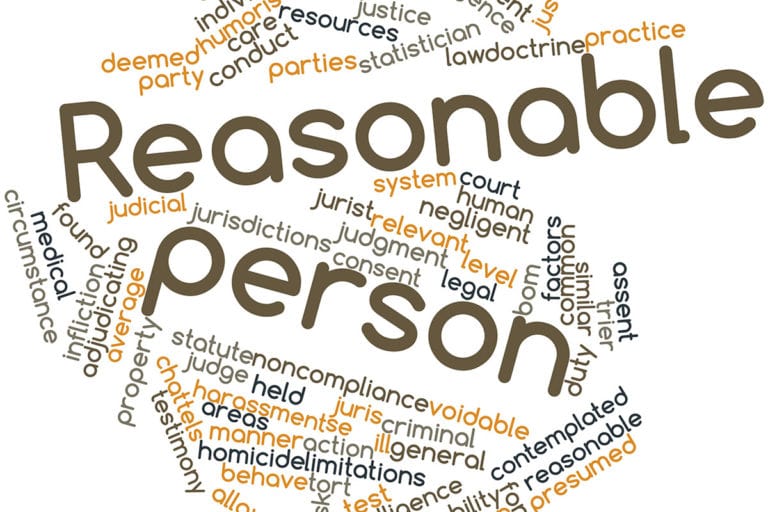You might think the reasonable person standard – a legal definition used around the globe – is both reasonable and standard. You would be wrong. Take a look.
'You couldn’t, but they could and did. The older you grow the more of it you’ll see. ... people have a way of carrying their resentments right into a jury box.'"
A Man of Ordinary Prudence
When there has been no other way to determine a defendant’s carelessness or intent, courts, for centuries, have taken the behaviour of a man of ordinary prudence as the standard. Even so, it was only formalized into law on January 23, 1837 in the Court of Common Pleas for England and Wales.
Ultimately, the Court decided that if negligence was based on the reasoning abilities of each individual, there would be no consistency. Instead
“… we ought rather to adhere to the rule which requires in all cases a regard to caution such as a man of ordinary prudence would observe.”
This was not an obvious decision, as the Court itself showed by referencing previous cases:
“… it is impossible to say what is gross negligence with reference to the standard of what is called ordinary prudence.”
“I never could understand what is meant by … a prudent man.”
“I cannot estimate the degree of care which a prudent man should take.”
The 1837 Court also noted that, in another case,
“… it appears that … a prudent man, has at length been abandoned.”
The Reasonable Person Standard
Undeterred, and returning it from near banishment to precedent–setting law, the Court institutionalized the prudent man. Over time, it morphed into the reasonable person standard. Yet one hundred and twenty-seven years later, in 1964, this “objective” standard was still causing confusion:
The Supreme Court of Canada Weighed In
In 1999, the Supreme Court of Canada (SCC):
a) reiterated the accepted definition of the reasonable person:
b) noted that “reasonable” must be determined on a case-by-case basis:
c) placed a higher standard based on expertise or regulations:
Each Person Must Be Reasonable
The reasonable person standard is not limited only to those directly involved in a lawsuit: Industry practice means that experts are held to the standard of the average person within their field.
Looking at the players in Ward v Quebec, the reasonable person standard might look like this:
- Was the comedian, Mike Ward, being reasonable when he told his jokes about a child with a disability?
- Should Jérémy Gabriel, then 10-13 years old, have considered the jokes reasonable, and not filed a complaint?
- Were Jérémy’s parents taking reasonable steps to protect their child?
- Was the school administration taking reasonable steps to stop bullying?
- Was the tribunal member making a reasonable decision in claiming discrimination had occurred?
- Were the appeals court judges reasonable in their review of the case?
- Were the SCC majority justices reasonable in changing the definition of the reasonable person?
- Were the SCC majority justices reasonable in making a hate speech case the basis for their decision about discrimination?
- Were the children who repeated the jokes being reasonable?
- Were the adults to scorned Jérémy’s mother acting like reasonable people?
Taking It Too Far?
The Ward majority stated that the Human Rights Tribunal’s authority had “been extended indirectly in recent decades.” In short, they grouped a comedian’s attacks against a child with a wide range of discrimination cases between adults. Consider these points:
- The Supreme Court of Canada is under no obligation to hear a case. Just because you ask, does not mean you will be heard.
- If rejected, the Court does not have to give its reasons; they have the choice to remain out of the argument.
- Very few tribunal cases are appealed as high as the SCC.
Ward v Quebec could have remained a little-known complaint between the two parties. It did not need to become a conduit for positioning people over free speech. Mike Ward wanted to see it that way because it suited him. The SCC did not need to pick up the torch.
Is it reasonable, then, to question whether the majority were taking this opportunity to make a point, instead of focusing on the facts specific to the bullying of a child by an adult?
By changing a definition to fit their interpretation, and taking a sharp turn away from decades of legal definitions and decisions, were the majority justices the ones being unreasonable? As lawyer Aaida Peerani notes:
"Based on Real Facts"
Consistent with more than 180 years of case law, all nine Supreme Court justices in Ward presumed the reasonable person standard to be objective: this concept was, and is, never questioned. But if we refer once again to the Cambridge dictionary, objective means “based on real facts and not influenced by personal beliefs or feelings.”
Yet judge and jury decisions regarding discrimination have all too often not been based on facts: think about the women, people of colour, and Indigenous peoples who did not always have the right to vote. And once voting rights were fought for and won, some minority groups had to wait much longer than others.
Were these practices and laws, set out by white politicians and judges, fair and based on facts? Or is it more reasonable to believe the men were influenced by personal beliefs and feelings? The politicians of the day had not even pretended objectivity or rational discussion:
Less than one hundred years ago, women in Canada were not even considered persons under the law until they appealed to the UK Privy Council in 1929. Because they were not persons, they could not hold public office. Was this reasonable and objective behaviour on the part of men? The Privy Council had this to say:
No One Is Immune To Bias
We can find the same evidence regarding every other identity-based issue. Discrimination and harassment exist because people who believe they are being reasonable and objective simply are not. Even the most intelligent and well–meaning can fail to see when emotions, disguised as rational thought, work to reinforce an inaccurate belief. If this were not the case, systemic discrimination would have been eliminated more than a century ago.
In his 2011 book, Thinking, Fast and Slow, Nobel prize winner Daniel Kahneman showed that judges are not immune. In one study, “tired and hungry judges tend to fall back on the easier default position of denying requests for parole.” In another:
Historically, even as judges in democracies have spoken so confidently of the objective, reasonable person, they have repeatedly, even if unconsciously, made subjective, unreasonable decisions regarding women and minority groups … and called them facts.

